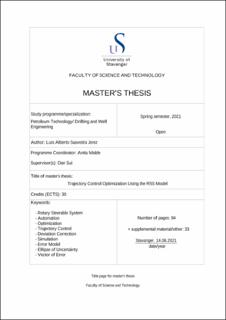| dc.description.abstract | Directional drilling has become a standard method to drill a well since the last decades, mainly caused by directional technologies and methods developments. The next step that the drilling industry is ready to take is to increase its automation levels to reduce their cost and increase the safe environment for field crews.
Moreover, the use of computers has allowed the creation of virtual tools that help drilling staffs visualize and foresee the issues and advantages through different phases from planning to post-analysis. Therefore, the present MSc thesis work focuses on developing a new approach (an in-house directional drilling simulator) to automatically and precisely estimate and control bit positions in real time.
This simulator is called Rotary Steerable System (RSS) Simulator and is based on the Trajectory Control Optimizer (TCO) and the RSS Model. The TCO was developed to plan the optimal trajectory, set the simulation targets, detect the bit deviations and create a correction path to return to the planned trajectory. Each of those processes is fulfilled without any human interaction during the simulation. The second element makes the simulation’s calculations on physics including Newton’s third law, beam bending analysis, bit force analysis, rate of penetration (ROP) to determine the bit position and then conduct RSS control to steer the bit accordingly. Such model is an upgraded version of the RSS Model developed by the University of Stavanger in 2020.
Besides, the RSS Simulator is a new tool that could interact with external models to interchange data and generate simulations closer to reality according to the factors involved. Furthermore, the simulator considers some uncertainty analysis and adds some noises (systematic and random) to the input data to give a more realistic behavior to the results. Thus, the RSS Simulator is the potential tool that might help the drilling industry walk towards automating most of its processes in the future. | |
